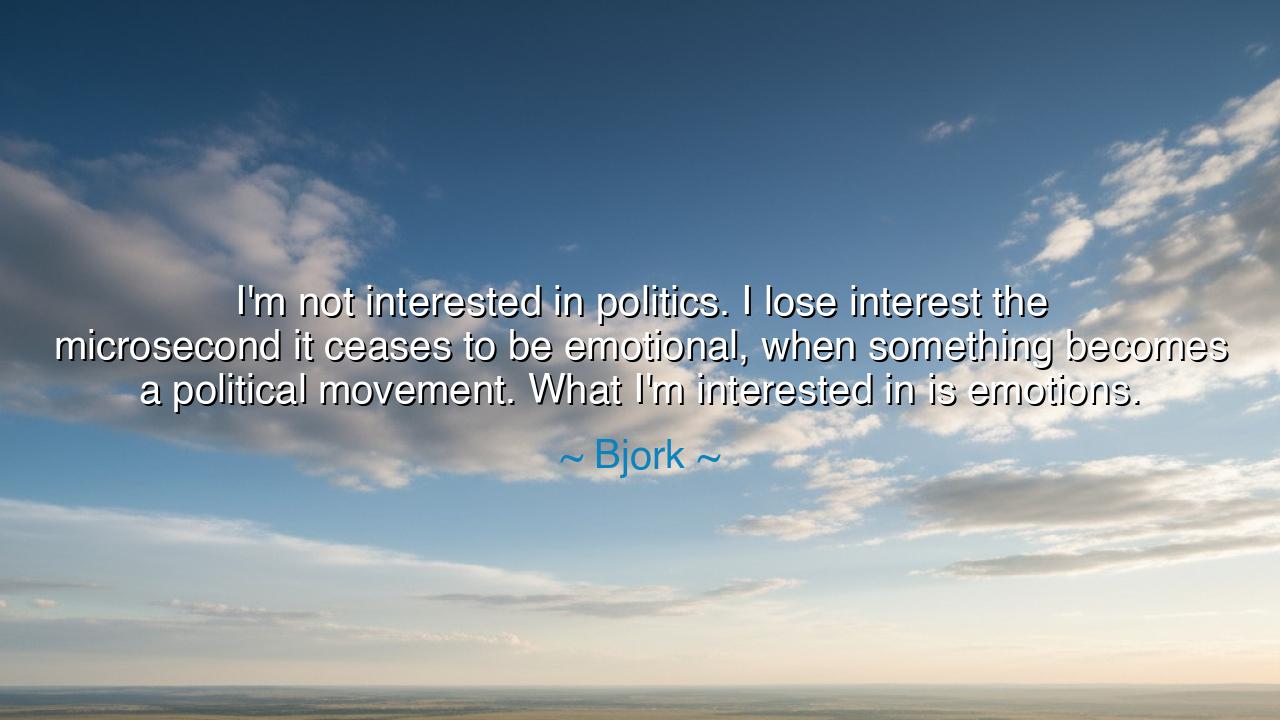
I'm not interested in politics. I lose interest the microsecond
I'm not interested in politics. I lose interest the microsecond it ceases to be emotional, when something becomes a political movement. What I'm interested in is emotions.






Politics, the ancient realm of power and governance, has long been the domain of rulers and sages, of laws and decrees. Yet, there are those among us, like Bjork, who see it not as the realm of cold strategy, but as a vessel for the deepest emotions of the human heart. She speaks of a truth that transcends the sterile halls of power: when politics ceases to stir the soul, when it becomes merely a movement driven by mechanisms and agendas, it loses its meaning. For what is politics if it does not reflect the emotions of the people, the pain of the oppressed, and the joy of the free?
Bjork declares her disinterest in the calculated games of power, the shifting of alliances, the manipulation of the masses. Her heart, like that of a true artist, is drawn not to the coldness of the political system, but to the fire that burns within the individual. The emotion is the pulse of all change, for without it, there is no true reason to move. When politics is stripped of feeling, it becomes no more than a lifeless machine, grinding out policies and laws with no regard for the human heart. Bjork would have us understand that it is not the movement that changes the world, but the emotions that ignite it.
Consider the Civil Rights Movement of the 20th century. Martin Luther King Jr., a leader of great political influence, did not rise to prominence solely by the force of his speeches or his political savvy. He was not simply a man of policy—he was a man whose words stirred the hearts of millions, whose emotions ignited the fires of change. When King spoke of dreams, it was not the cold calculation of a politician that rang out, but the deep emotion of a man who sought justice, equality, and the very soul of humanity. His movement, though political in nature, was driven by the passion of a people who had suffered for far too long.
The emotional nature of a cause is what makes it resonate through the ages. Remember the words of Gandhi, who led a nation not through the machinery of politics, but through the strength of his heart. His non-violent resistance was not merely a political strategy, but a reflection of his belief in the power of emotion—the deep, unwavering emotion of love, truth, and justice. Gandhi's revolution was not won through the manipulation of politics, but through the force of human emotion that called to the hearts of the oppressed.
Bjork thus offers a profound lesson to those who would seek to change the world. Politics, when it becomes a cold and soulless enterprise, can no longer inspire. Emotion, however, is eternal—it is what binds us all together, what pushes us to rise above our circumstances and fight for something greater than ourselves. If we are to create a world that reflects our highest ideals, it is not enough to speak in the language of politics. We must speak from the heart, for only through the power of emotion can true change arise.
So, remember this, future generations: let the fires of emotion guide you, for they are the flame that lights the path to transformation. Politics may organize our lives, but it is the emotions of the people—their hopes, their dreams, their pain—that shape the world. Let us, like Bjork, seek to tap into that force, for it is through emotion, not mere movement, that we shall forge a future worthy of our highest aspirations.






PMPham Micalh
Bjork’s view on politics speaks to a common frustration: that movements often lose their emotional authenticity as they become more institutionalized. It makes me think—does this emotional disconnect contribute to apathy in political engagement? Could more politicians or activists focus on the emotional aspects of the issues they’re fighting for, to better connect with people’s real, lived experiences?
GDGold D.dragon
Bjork’s disinterest in politics once it becomes a movement makes me reflect on the way politics is often structured. Is it possible for political movements to retain the emotional urgency and passion that drive them at their inception? Or do they inevitably become more about strategy and power? Can there be a middle ground where both the emotional and political aspects of change coexist meaningfully?
THNguyen Tuyet Huong
Bjork’s statement feels like a critique of how politics can often become cold and detached as it evolves into a movement or a system. If politics loses its emotional appeal, does it stop being relevant to the people it’s supposed to serve? How can we ensure that political movements stay connected to the emotions that inspire them in the first place? Is it possible for political action to truly remain heartfelt in today’s climate?
NHNhan Hoang
Bjork’s perspective on politics makes me wonder if she’s onto something. Is politics too often about movements and power struggles, rather than about the emotional impact on people? Can emotions be the true drivers of change in society, or is it inevitable that political movements will eventually become detached from the feelings that originally sparked them? Is it possible to keep the emotional aspect alive while still pushing for systemic change?
HCHa Cao
Bjork’s approach to politics is a bit of a departure from the typical view, focusing on emotion rather than structure or ideology. But I wonder if her disinterest in politics because it becomes a movement is understandable. Does politics become less about people and more about power when it becomes institutionalized? Can we ever have politics that truly taps into the emotional experiences of individuals, or is that too idealistic?